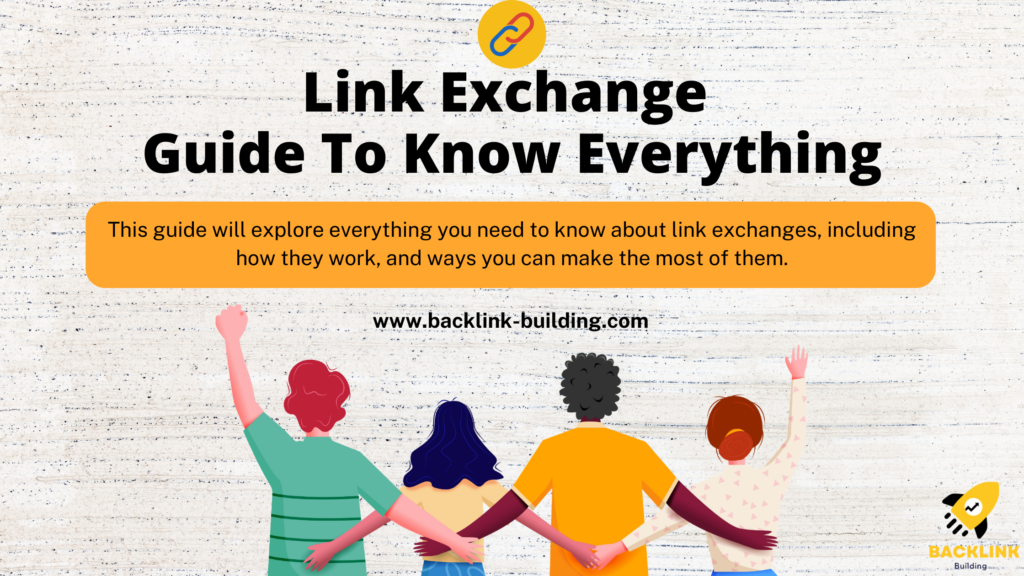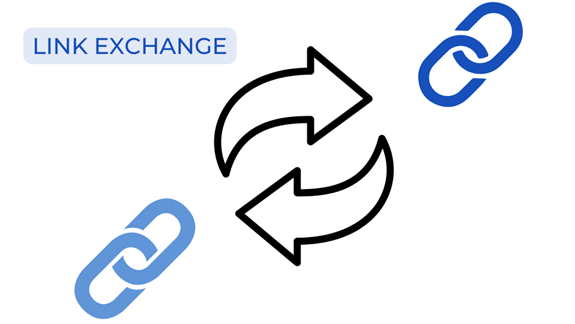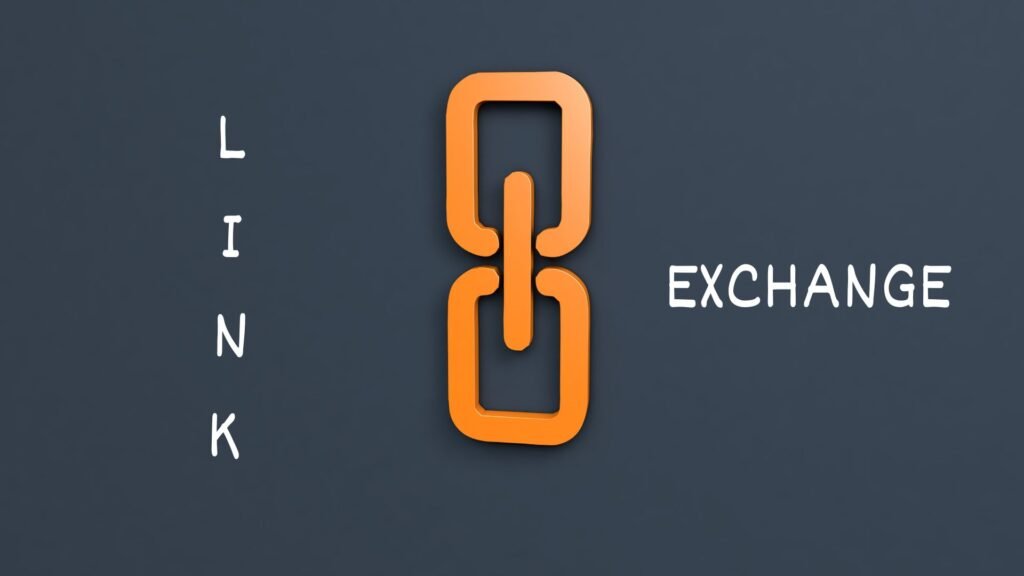
We came across several link-building techniques while working on SEO for our clients. Some methods were more effective, but link exchange was always a top performer.
Link exchange is a widely used method by SEO professionals or link-building agencies to boost SEO and improve website authority. However, using this method, you must be careful; it can also do the opposite.
This guide will explore everything you need to know about link exchanges, including how they work, their benefits, and how you can make the most of them. We’ll also answer some frequently asked questions about link exchanges. So let’s get started!
Before understanding Link Exchange, we need to understand what a link is. Links are incoming links to a website or web page. When another website links to your site, it’s considered a link.
What Is A Link Exchange?

Link exchange is a process whereby two or more websites agree to link to each other’s content to improve their respective search engine rankings. This is done by exchanging links with other websites deemed high quality and relevant to your content.
It is not a new concept and has been used by web admins for many years. It can benefit both parties involved, as they can help increase traffic and visibility for both websites. Getting the results will take some time, but it’s worth it in the long run.
How Does Link Exchange Work?
Link exchanges work by each link to the other website’s content. It is essential to exchange it from a relevant and quality site. This is usually done by exchanging links with other websites deemed high quality and relevant to your website’s content to benefit from link exchange.
Here Are A Few Tips For Getting Links Exchange

Promote Content
Link exchange helps our website get more traffic and rank in SERP. If our website’s content is good, other websites will also be interested in linking to it. This creates opportunities for link exchange.
Identify Potential Link Partners
The step is to find websites relevant to your content and have a high-quality backlink profile. Once you’ve seen some potential link partners, the next step is to contact them and request a link exchange.
Email Link Request
Emailing the webmaster of another site you want to exchange links with and providing them with a link to your site is always a good idea. This lets them see whether their readers would find your site valuable. Most web admins are happy to exchange links with relevant and high-quality sites.
Approve Link Partners
After you’ve found some potential link partners who agreed to exchange links with you, the next step is to approve their site. This ensures that the sites linking to you are high-quality and relevant.
Is A Link Exchange Good For SEO?
Yes, link exchange for SEO can be good if done correctly. Link exchanging can help to increase traffic and visibility for both websites involved in the exchange. However, it is essential to ensure that the links exchanged are relevant to the content of both websites. Otherwise, the link exchange could hurt your website’s search engine ranking.
SEO Professionals or Link are building professional searching to get link exchange from other website owners and bloggers to get excellent results in their search engine rankings.
Ways Links Exchanges Can Hurt Your SEO
Some advantages come with naturally occurring link exchanges. Stilt, this activity can harm your website’s authority and search engine ranking when you are not focused on the link exchange parts.
Here are a few cases where links can hurt your SEO:
Decrease In Domain Authority
If you link to too many low-quality websites, your website’s Domain Authority can suffer.
Link Exchange With Spammy Websites
If you exchange links with a website known to be spammy, it could hurt your website’s reputation.
Website Penalties
Google webmaster guidelines do not suggest link exchanges. If we misuse backlink exchange and try to manage search results only by exchanging links, there is a chance that Google may penalize our website.
Enhancing SEO With Direct Competitors
The chances of exchanging links with websites with the exact target keywords and phrases as our website has decreased the chances of exchanging that link. Consequently, you’re only improving your competition’s SEO, not your own.
Who should execute link exchanges or reciprocated links between websites with similar content and topics rather than between directly competing sites?
How To Do Link Exchange?
Here are some of the most popular SEO link exchange methods:
Link Baiting
Link baiting is a method of creating content that is so compelling that other website owners will want to link to it. Who can do this by creating informative blog posts, infographics, or videos?
This can be very effective, but creating high-quality content takes time and effort.
Resource Page Links
A resource page is a page on a website that lists helpful resources on a particular topic. You can contact the owner of a resource page and ask to be included on their list.
This method is less time-consuming than link baiting, but getting your link approved can be more challenging.
Guest Blogging
Guest blogging is when you write an article for another website in exchange for a link back to your website. This process can be time-consuming, but it is a great way to build relationships with other website owners and create high-quality content, and It can even benefit you in the long run.
Link Directories
Many link directories on the Internet list websites in various categories. You can submit your website to these directories and get a link back to your website.
Social Media Linking
Social media is a great way to promote your website’s content and get links from other websites. When you share your content on social media, include a link to your website.
Comment Linking
Comment linking is a method of getting links by leaving comments on other websites with links back to your website. However, who should use this method sparingly, as it can come across as spammy? Most SEO professionals avoid this method. But it’s still up to you whether you want to use it.
What To Look At When Considering A Link Exchange?
There are a few things you should consider before exchanging links with another website:
- Relevancy: Ensure the website you are considering link exchange is relevant to your website. If the website is irrelevant, the link will not benefit your SEO.
- Domain Authority: You want to ensure the website you are linking to has a high Domain Authority score. His score indicates how well a website will rank on search engine results pages.
- Link Location: When exchanging links, ensure the link is placed in a location easily accessible to website visitors. You don’t want to hide the link on your website or bury it in the footer. O Google might consider it has spammy link-building techniques.
- Page Rank: The PageRank score of a page indicates how important the page is. A higher PageRank score means the page is more likely to rank highly in search engine results pages.
- Link Quality: When exchanging links, you want to ensure that the link pointing to your website is high-quality. A high-quality link will come from a website with a high Domain Authority and PageRank score.
Benefits Of Link Exchanging
Here are some of the benefits of link exchange:
- Help you build relationships with other website owners.
- Help you create high-quality content.
- It can help you get links from websites with a high Domain Authority score.
- It can help you get links from websites with a high PageRank score.
- Improve your website SEO.
- Increases traffic to the website.
- Generate more leads and sales.
- Promotes your brand and business.
Drawbacks Of Link Exchanging
It can sometimes result in low-quality links.
- It can be time-consuming.
- It may not be beneficial for your SEO if done incorrectly.
- This may result in a decrease in traffic if Google’s link-building guidelines are not followed.
- It may result in Google penalizing your website if done incorrectly.
- It Could potentially hurt your relationship with other website owners. You are not maintaining website Authoritativeness.
- It might not be worthwhile if you’re not receiving high-quality links.
Is It Worth Investing In Link Exchange In 2025?
The Answer to this is, “It Depends.” Link exchange can be beneficial for your website if it is done correctly.
- Re-exchanging links with high-quality websites relevant to your website can improve your SEO.
- However, link exchange can hurt your SEO if you exchange links with low-quality or competing websites.
It can also be time-consuming, so weigh the pros and cons before deciding if it suits your website.
If you are unsure whether link exchanging suits your website, it is best to consult a professional SEO expert.
What Is Google’s Policy On Link Exchange?
Google’s policy on link exchange is that who should do it sparingly and only with high-quality, relevant websites. Linking to low-quality websites or exchanging excessive links can hurt your website’s SEO.
In 2021, Google introduced its LinkSpam update. The algorithm update changed how Google’s ranking system values links from spammy sites, such as spammy or poor-quality sites. The Update Link Spam algorithm targets websites with spammy link-building practices, such as link farms, excessive link exchanging, and buying links.
If you violate Google’s Link Spam policy, your website may be penalized accordingly. T can result in a decrease in traffic and search engine rankings.
To avoid being penalized by Google, it is best to avoid link exchange altogether or only exchange links with high-quality, relevant websites. Follow Google’s guidelines and avoid violating their Link Spam policy.
FAQs
Q: What Is Link Exchange?
A: Link exchange is when two websites agree to link to each other’s content. This is usually done to improve both websites’ search engine rankings.
Q: How Does Link Exchange Work?
A: Link exchange works by each website linking to the other website’s content. This is usually done by exchanging links with other websites deemed high-quality and relevant to your content.
Q: Are Excessive Link Exchanges Risky?
A: If link exchange is done excessively or with low-quality websites, it can hurt your website’s SEO. This is because Google may view excessive Link exchanging as a spammy link-building technique and penalize your website accordingly.
Q: What Should Be Included In Link Exchange Requests?
A: When requesting a link exchange, you should include the following:
- The URL of the page where you will place your link.
- The title and description of your website.
- The URL of the page on your website is what will place the link to the other website.
Q: How Many Link Exchanges Should I Do?
A: There is no set number of link exchanges that you should do. However, it is best to keep it to a minimum and only exchange links with high-quality, relevant websites.
Conclusion
Now, with the above link exchange guide, you should better understand how it works and whether it suits your website. It can be beneficial for your website if done correctly, but it can also be risky if not done correctly.
When requesting link exchanges, include all the relevant information to avoid violating policies. Lastly, keep it to a minimum and only exchange links with high-quality, relevant websites to avoid being penalized by Google. Linking excessively or with low-quality websites will likely decrease traffic and search engine rankings.
Thank you for reading! I hope this guide helped you understand everything about link exchange. If you have questions you did not answer in this guide, please leave them in the comments below, and we will get back to you as soon as possible. Happy linking!


